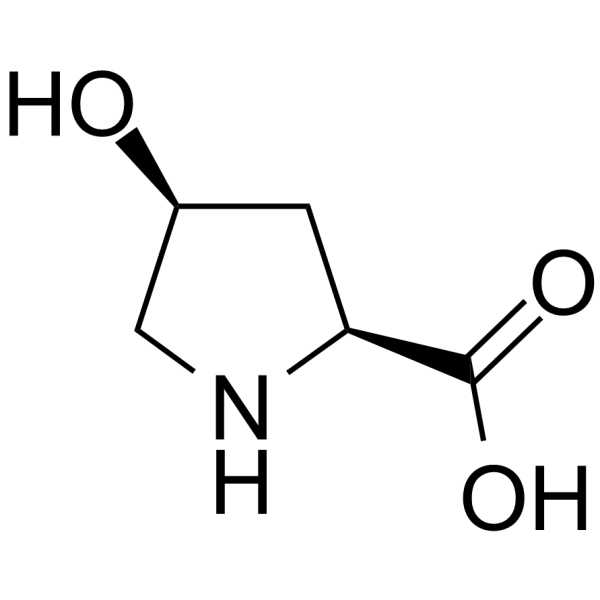
cis-4-Hydroxy-L-proline
CAS No. 618-27-9
cis-4-Hydroxy-L-proline( —— )
Catalog No. M28133 CAS No. 618-27-9
cis-4-Hydroxy-L-proline is an inhibitor of the synthesis and extracellular deposition of collagen. cis-4-Hydroxy-L-proline could inhibit fibroblast growth by preventing the deposition of triple-helical collagen on the cell layer.
Purity : >98% (HPLC)
 COA
COA
 Datasheet
Datasheet
 HNMR
HNMR
 HPLC
HPLC
 MSDS
MSDS
 Handing Instructions
Handing Instructions
| Size | Price / USD | Stock | Quantity |
| 100MG | 35 | In Stock |


|
| 500MG | 82 | In Stock |


|
| 1G | Get Quote | In Stock |


|
Biological Information
-
Product Namecis-4-Hydroxy-L-proline
-
NoteResearch use only, not for human use.
-
Brief Descriptioncis-4-Hydroxy-L-proline is an inhibitor of the synthesis and extracellular deposition of collagen. cis-4-Hydroxy-L-proline could inhibit fibroblast growth by preventing the deposition of triple-helical collagen on the cell layer.
-
Descriptioncis-4-Hydroxy-L-proline is an inhibitor of the synthesis and extracellular deposition of collagen. cis-4-Hydroxy-L-proline could inhibit fibroblast growth by preventing the deposition of triple-helical collagen on the cell layer.(In Vivo):cis-4-Hydroxy-L-proline depressed the growth of primary N-nitrosomethylurea-induced rat mammary tumors.
-
In Vitro——
-
In Vivo——
-
Synonyms——
-
PathwayProteasome/Ubiquitin
-
TargetEndogenous Metabolite
-
RecptorTelomerase
-
Research Area——
-
Indication——
Chemical Information
-
CAS Number618-27-9
-
Formula Weight131.131
-
Molecular FormulaC5H9NO3
-
Purity>98% (HPLC)
-
SolubilityIn Vitro:?H2O : 100 mg/mL (762.60 mM)
-
SMILESO[C@@H]1CN[C@@H](C1)C(O)=O
-
Chemical Name——
Shipping & Storage Information
-
Storage(-20℃)
-
ShippingWith Ice Pack
-
Stability≥ 2 years
Reference
1.Ameri Z, et al. Telomerase inhibitor MST-312 induces apoptosis of multiple myeloma cells and down-regulation of anti-apoptotic, proliferative and inflammatory genes. Life Sci. 2019;228:66-71.
molnova catalog



related products
-
(R)-3-Hydroxybutanoi...
(R)-3-Hydroxybutanoic acid sodium ((R)-3-Hydroxybutyric acid) is a chiral precursor that can be used to synthesize biodegradable PHB and its copolyesters. (R)-3-Hydroxybutanoic acid sodium can be used as a nutrient in plants.
-
(+)-Longifolene
(+)-Longifolene is a naturally occurring.
-
Dodecanoylcarnitine
Dodecanoylcarnitine ((-)-Lauroylcarnitine) has been associated with disturbances in fatty acid oxidation, and the use of Dodecanoylcarnitine resulted in an increase in the permeability of salmon calcitonin.



 Cart
Cart
 sales@molnova.com
sales@molnova.com


